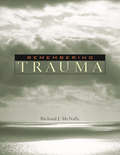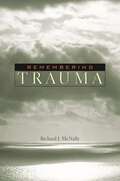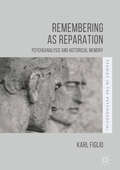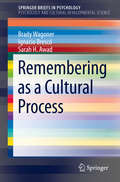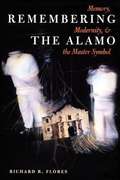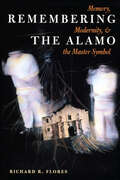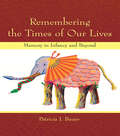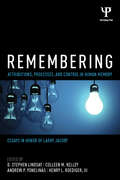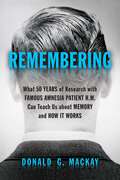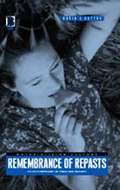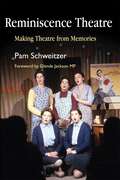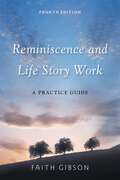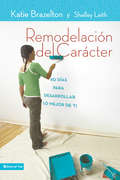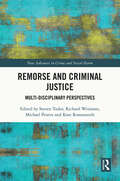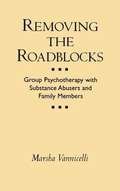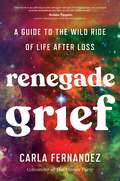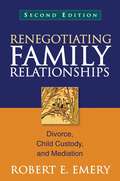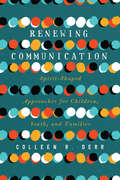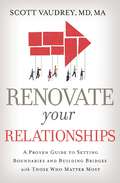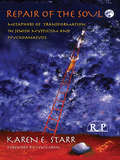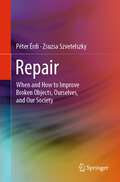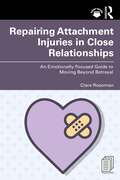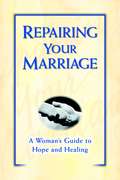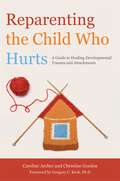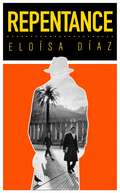- Table View
- List View
Remembering Trauma
by Richard J. McNallyAre horrific experiences indelibly fixed in a victim's memory? Or does the mind protect itself by banishing traumatic memories from consciousness? How victims remember trauma is the most controversial issue in psychology today, spilling out of consulting rooms and laboratories to capture headlines, rupture families, provoke legislative change, and influence criminal trials and civil suits. This book, by a clinician who is also a laboratory researcher, is the first comprehensive, balanced analysis of the clinical and scientific evidence bearing on this issue--and the first to provide definitive answers to the urgent questions at the heart of the controversy. Synthesizing clinical case reports and the vast research literature on the effects of stress, suggestion, and trauma on memory, Richard McNally arrives at significant conclusions, first and foremost that traumatic experiences are indeed unforgettable. Though people sometimes do not think about disturbing experiences for long periods of time, traumatic events rarely slip from awareness for very long; furthermore, McNally reminds us, failure to think about traumas--such as early sexual abuse--must not be confused with amnesia or an inability to remember them. In fact, the evidence for repressed memories of trauma--or even for repression at all--is surprisingly weak. A magisterial work of scholarship, panoramic in scope and nonpartisan throughout, this unfailingly lucid work will prove indispensable to anyone seeking to understand how people remember trauma.
Remembering Trauma
by Richard J. Mcnally<p>Are horrific experiences indelibly fixed in a victim's memory? Or does the mind protect itself by banishing traumatic memories from consciousness? How victims remember trauma is the most controversial issue in psychology today, spilling out of consulting rooms and laboratories to capture headlines, rupture families, provoke legislative change, and influence criminal trials and civil suits. This book, by a clinician who is also a laboratory researcher, is the first comprehensive, balanced analysis of the clinical and scientific evidence bearing on this issue--and the first to provide definitive answers to the urgent questions at the heart of the controversy. <p>Synthesizing clinical case reports and the vast research literature on the effects of stress, suggestion, and trauma on memory, Richard McNally arrives at significant conclusions, first and foremost that traumatic experiences are indeed unforgettable. Though people sometimes do not think about disturbing experiences for long periods of time, traumatic events rarely slip from awareness for very long; furthermore, McNally reminds us, failure to think about traumas--such as early sexual abuse--must not be confused with amnesia or an inability to remember them. In fact, the evidence for repressed memories of trauma--or even for repression at all--is surprisingly weak. <p>A magisterial work of scholarship, panoramic in scope and nonpartisan throughout, this unfailingly lucid work will prove indispensable to anyone seeking to understand how people remember trauma.</p>
Remembering as Reparation
by Karl FiglioBelow we have provided very simple written essay and speech on the Mahatma Gandhi, a person who would always live in the heart of everyone. Every kid and children of the India know him by the name of Bapu or Father of the Nation. Using this you can help your kids and school going children to write essay or recite speech on the Mahatma Gandhi in their school
Remembering as a Cultural Process (SpringerBriefs in Psychology)
by Brady Wagoner Sarah H. Awad Ignacio BrescóThis brief charts out principles for a cultural psychology of remembering. The idea at its core is a conceptualization of remembering as a constructive process--something that occurs at the intersection of a person and their social-cultural world. To do this, it moves away from the traditional metaphor of memory as storage and develops the alternative metaphor of construction as part of wider social and cultural developments in society. This new approach is developed from key ideas of Lev Vygotsky and Frederic Bartlett, in particular their concepts of mediation and reconstructive remembering. From this foundation, the authors demonstrate how remembering is conflictual, evolving, and transformative at both the individual and collective level. This approach is illustrated with concrete case studies, which highlight key theoretical concepts moving from micro-level processes to macro-level social phenomena. Among the topics covered are:The microgenesis of memories in conversationThe role of narrative mediation in the recall of historyRemembering through social positions in conflictsUrban memory during revolutionsHow memorials are used to channel grief and collective memoryRemembering as a Cultural Process traces our ongoing journey to answer the question of the different ways in which culture participates in and is constitutive of what it means for humans to remember. It will be of interest to undergraduate and graduate students as well as researchers in the fields of memory studies or cultural psychology.
Remembering the Alamo: Memory, Modernity, and the Master Symbol
by Richard R. FloresExamines how the Alamo's transformation into an American cultural icon helped to shape social, economic, and political relations between Anglo and Mexican Texans.
Remembering the Alamo: Memory, Modernity, and the Master Symbol (CMAS History, Culture, and Society Series)
by Richard R. Flores"Remember the Alamo!" reverberates through Texas history and culture, but what exactly are we remembering? <P><P>Over nearly two centuries, the Mexican victory over an outnumbered band of Alamo defenders has been transformed into an American victory for the love of liberty. Why did the historical battle of 1836 undergo this metamorphosis in memory and mythology to become such a potent master symbol in Texan and American culture? <P> In this probing book, Richard Flores seeks to answer that question by examining how the Alamo's transformation into an American cultural icon helped to shape social, economic, and political relations between Anglo and Mexican Texans from the late nineteenth to the mid-twentieth centuries. In the first part of the book, he looks at how the attempts of heritage society members and political leaders to define the Alamo as a place have reflected struggles within Texas society over the place and status of Anglos and Mexicans. In the second part, he explores how Alamo movies and the transformation of Davy Crockett into an Alamo hero/martyr have advanced deeply racialized, ambiguous, and even invented understandings of the past.
Remembering the Times of Our Lives: Memory in Infancy and Beyond (Developing Mind Series)
by Patricia J. BauerThe purpose of Remembering the Times of Our Lives: Memory in Infancy and Beyond is to trace the development from infancy through adulthood in the capacity to form, retain, and later retrieve autobiographical or personal memories. It is appropriate for scholars and researchers in the fields of cognitive psychology, memory, infancy, and human development.
Remembering: Attributions, Processes, and Control in Human Memory (Psychology Press Festschrift Series)
by D. Stephen Lindsay Colleen M. Kelley Andrew P. Yonelinas Henry L. Roediger IIIIn the 22 chapters in this volume, many of the world’s foremost memory scientists report on their cutting-edge research on the nature of human memory, with several chapters reporting new empirical studies that are being published for the first time. All the contributions are inspired by the work of Larry Jacoby on human memory, with his emphasis on episodic memory -- that is, the processes and mechanisms that enable us to remember our own past experiences. In addition, the volume reflects Jacoby's appreciation that memory enters into a wide range of psychological phenomena, including perceiving, attending, and performing. The stellar list of contributors and the breadth of coverage makes this volume essential reading for researchers and graduate students in cognitive psychology and cognitive neuroscience, as well as being a tribute and celebration of the inspirational, groundbreaking -- and ongoing -- work of Larry Jacoby.
Remembering: What 50 Years of Research with Famous Amnesia Patient H.M. Can Teach Us about Memory and How It Works
by Donald G. MacKayThe psychologist who worked with a famous amnesiac patient for fifty years explains what his studies show about how memory functions and ways to keep the brain sharp. At age twenty-seven, Henry Molaison underwent brain surgery to remedy life-threatening epilepsy. This operation inadvertently destroyed his hippocampus, the engine in the brain for forming new memories. Henry--until recently, known only as Patient H.M.--suffered catastrophic memory failures for the rest of his life and he became the most studied amnesia patient in the history of the world. Dr. Donald MacKay's studies with Henry span fifty years. They reveal the profound importance of memory. Memory decline impacts everything that makes a normal human mind and brain worth having: creative expression; artistic endeavors; awareness; and the ability to plan, to comprehend, to detect and correct errors, to appreciate humor, to imagine hypothetical situations, and to perceive novelty in the world. His research also shows how to keep memories sharp at any age and how to offset the degradation that aging and infrequent use inflict on memory. Remembering summarizes other results of the revolution in scientific understanding of mind and memory that began with Henry. Importantly, it makes good on the promise that research with Henry would help others by focusing on what readers who wish to maintain the everyday functioning of memory, mind, and brain (their own or others') can learn from the still ongoing revolution that he inspired.
Remembrance of Repasts: An Anthropology of Food and Memory (Materializing Culture)
by David E. SuttonThis book offers a theoretical account of the interrelationship of culture, food and memory. Sutton challenges and expands anthropologys current focus on issues of embodiment, memory and material culture, especially in relation to transnational migration and the flow of culture across borders and boundaries. The Greek island of Kalymnos in the eastern Aegean, where Islanders claim to remember meals long past -- both humble and spectacular provides the main setting for these issues, as well as comparative materials drawn from England and the United States. Despite the growing interest in anthropological accounts of food and in the cultural construction of memory, the intersection of food with memory has not been accorded sustained examination. Cultural practices of feasting and fasting, global flows of food as both gifts and commodities, the rise of processed food and the relationship of orally transmitted recipes to the vast market in speciality cookbooks tie traditional anthropological mainstays such as ritual, exchange and death to more current concerns with structure and history, cognition and the anthropology of the senses. Arguing for the crucial role of a simultaneous consideration of food and memory, this book significantly advances our understanding of cultural processes and reformulates current theoretical preoccupations.
Reminiscence Theatre: Making Theatre from Memories
by Faith Gibson Pam SchweitzerReminiscence theatre is about seeing and realising the dramatic potential in real life stories. It takes verbatim memories as the basis for theatre scripts, using the experiences of older people as a source of artistic productions and therapeutic creativity. This book is a comprehensive guide to the nature, practice and therapeutic effects of reminiscence theatre. Drawing on examples from a range of real-life case studies, Pam Schweitzer provides practical advice on the process of taking an oral history, creating from it a written script and developing that into a dramatic production, on whatever scale. The book outlines five components of key significance that the form affords: artistic development through creating original productions; cultural development, by creating reminiscence theatre in multi-cultural contexts, including dual-language productions; educational development through the intergenerational sharing and enactment of memories; psycho-social development for older people by reliving and reshaping past experiences; and health care, by using improvised reminiscence drama therapeutically with people with dementia and their carers. This book will be of great interest to theatre workers, social work professionals and carers of older people, arts therapy practitioners and students in these fields.
Reminiscence and Life Story Work
by Faith GibsonReminiscence is a valuable tool for the professional carer as well as those who are looking after a family member or friend. It enhances and enriches the care relationship, and benefits both the person being cared for and the carer. This fully-updated fourth edition is full of practical information on planning and running successful reminiscence work. It will enable carers and health and social care practitioners to develop the attitude, knowledge, understanding, values and skills they need to use reminiscence with people of all ages, either individually or in groups, and in residential or community settings. Topics covered include reminiscence with individuals and couples, inter-generational reminiscence, reminiscence with individuals from minority ethnic groups and reminiscence with people with sensory and learning disabilities, dementia, depression and terminal illness. This book is the ideal starting point for any professional taking up reminiscence work, as well as for those who wish to deepen their knowledge and increase their ability to help those they care for in less formal ways.
Remodelacion de Caracter
by Katherine F. Brazelton Shelley LeithLlegue a ser la mejor "usted" aprendiendo los ocho rasgos más importantes del carácter para vivir una vida llena de propósito. ¡Le LLevará solo cuarenta días transformar su vida!
Remorse and Criminal Justice: Multi-Disciplinary Perspectives (New Advances in Crime and Social Harm)
by Richard Weisman Michael Proeve Steven Tudor Kate RossmanithThis multidisciplinary collection brings together original contributions to present the best of current thinking about the nature and place of remorse in the context of criminal justice. Despite the wide-spread and long-standing nature of interest in offender remorse, the topic has until recently been peripheral in academic studies. The authors are scholars from North America, the UK, Europe, South Africa and Australia, from diverse academic disciplines. They reflect on the role of remorse in law, for better or for worse, on how expressions of remorse are affected by the legal contexts in which they arise, and on the impact of these expressions on the individual, the court, and the community. The work is divided into four parts – Part I Judging Remorse addresses issues concerning the task of assessing remorse in the courtroom, usually prior to determining sentence. Part II Remorse Beyond the Courtroom explores the place and significance of remorse in various post-court settings. Part III Remorse, War and Social Trauma addresses remorse in the context of political violence and social trauma in the former Yugoslavia and South Africa. Finally, Part IV Reflections seeks to underscore the multidisciplinary and interdisciplinary nature of the collection as a whole, through personal and disciplinary reflections on remorse. The work provides a showcase for how diverse academic disciplines can be brought together through a focus on a common topic. As such, the collection will become a standard reference work for further research across a range of disciplines and promote inter-disciplinary dialogue.
Removing the Roadblocks: Group Psychotherapy with Substance Abusers and Family Members
by Marsha VannicelliRemoving the Roadblocks analyzes the group therapy issues that arise in the three populations most commonly seen in substance abuse clinics--substance abusers themselves, adult children of alcoholics, and other family members. It is a useful text for courses on substance abuse in social work, psychology, nursing, and other disciplines, as well as for courses in group psychotherapy.
Renegade Grief: A Guide to the Wild Ride of Life after Loss
by Carla FernandezFrom grief quests to altar-making, to dinner parties to Dungeons & Dragons, Renegade Grief is an &“offering to the struggle and art of being human&” (Krista Tippett, New York Times bestselling author) and a profound, vulnerable exploration of care practices and rituals that empower grievers in a culture that expects us to simply &“give it time.&”So, you&’ve lost someone. At first, there is an outpour of support and phone calls and care packages. But after the services are done and the phone stops ringing, there is a quiet in the air and an expectation to get on with your life. The problem is that death has a way of making all plans go out the window. Renegade Grief offers the support in this next stage of grieving—when you feel isolated in your loss and are figuring out how to navigate it. Shaped by her own experience with the death of her father and her time cofounding The Dinner Party, a leading peer-support organization for people who&’ve experienced a major loss, Carla Fernandez pushes back on the death-denying culture we live in. For too long, grief has been treated as something pitiable, simply sad, to be gotten over as soon as possible. But after fifteen years of being in a community with fellow grievers, Carla has witnessed a different side of the story. Grieving a significant loss is hardcore, hardly something to be swept under the rug, but an experience to be held with respect, a creative spirit, and with friends. Through inspiring stories of real grievers, patterns from across history, and fresh science, Renegade Grief enlivens you with the permission and possibility to explore your grief in your own unique way and reminds you that you&’re not alone in doing it. Renegade Grief is an indispensable resource for people at any stage of the grieving process and with Carla&’s candid and compassionate guidance, you learn that life after loss isn&’t about the futile attempt of arriving at some other side. Rather, it&’s about building your community, adjusting to change, and finding the way for your grief to become a pathway into your own version of a soulful life.
Renegotiating Family Relationships, Second Edition
by Robert E. EmeryLong recognized as the authoritative guide for clinicians working with divorcing families, this book presents crucial concepts, strategies, and intervention techniques. Robert E. Emery describes how to help parents navigate the emotional and legal hurdles of this painful family transition while protecting their children's well-being. The book is grounded in cutting-edge research on family relationships, parenting, and children's adjustment, including Emery's groundbreaking longitudinal study of the impact of divorce mediation versus litigation. It provides a detailed treatment manual for mediating custody and other disputes, developing collaborative parenting plans, and fostering positive postdivorce family relationships. New to This Edition, Reflects the latest psychological research, as well as divorce and custody law. Chapters on understanding and addressing divorcing partners' anger and grief. Treatment manual chapters have been extensively revised. Incorporates the author's 12-year follow-up study.
Renewing Communication: Spirit-Shaped Approaches for Children, Youth, and Families
by Colleen R. DerrWe are constantly communicating.Renewing Communicationtheories of human developmenthow to understand your audience and contextsetting specific goalsnonverbal communicationeffective techniquesusing creativityevaluation and assessment
Renovate Your Relationships: A Proven Guide to Setting Boundaries and Building Bridges with Those Who Matter Most
by Scott Vaudrey Md MaDoctor-turned-pastor Scott Vaudrey shows readers how to have stronger, more meaningful relationships by mastering the balance between building bridges and setting boundaries.We all have people in our lives who are difficult--a demanding boss, an annoying neighbor, a manipulative family member, or a controlling spouse. When you reach a point where something must change in that troubling relationship, how do you narrow the gap between where things are and where you want them to be?In Renovate Your Relationships, Scott Vaudrey draws on his experience as both an emergency-room physician and a pastor to reveal how we can diagnose the problems in our specific relationships and then master the balance between building bridges toward people and setting boundaries with them. Using real-life stories, illuminating dialogues, and ground-breaking practical tools, he unearths the root cause of our relational breakdowns and helps us make changes that enable us to move forward with a new, more productive pattern of relating.
Repair of the Soul: Metaphors of Transformation in Jewish Mysticism and Psychoanalysis (Relational Perspectives Book Series #Vol. 38)
by Karen E. StarrRepair of the Soul examines transformation from the perspective of Jewish mysticism and psychoanalysis, addressing the question of how one achieves self-understanding that leads not only to insight but also to meaningful change. In this beautifully written and thought-provoking book, Karen Starr draws upon a contemporary relational approach to psychoanalysis to explore the spiritual dimension of psychic change within the context of the psychoanalytic relationship. Influenced by the work of Lewis Aron, Steven Mitchell and other relational theorists, and drawing upon contemporary scholarship in the field of Jewish studies, Starr brings the ideas of the Kabbalah, the ancient Jewish mystical tradition, into dialogue with modern psychoanalytic thought. Repair of the Soul provides a scholarly integration of several kabbalistic and psychoanalytic themes relating to transformation, including faith, surrender, authenticity, and mutuality, as well as a unique exploration of the relationship of the individual to the universal. Starr uses the Kabbalah’s metaphors as a vivid framework with which to illuminate the experience of transformation in psychoanalytic process, and to explore the evolving view of the psychoanalytic relationship as one in which both parties - the analyst as well as the patient - are transformed.
Repair: When and How to Improve Broken Objects, Ourselves, and Our Society
by Péter Érdi Zsuzsa SzvetelszkyThis book propagates a new way of thinking about managing our resources by integrating the perspectives of complex systems theory and social psychology. By resources, the authors mean objects, such as cell phones and cars, and human resources, such as family members, friends, and the small and large communities they belong to. As we all face the "replace or repair" dichotomy, readers will understand how to repair themselves, their relationships, and communities, accept the "new normal," and contribute to repairing the world. The book is offered to Zoomers, growing up in a world where it seems everything is falling apart; people in their 30s and 40s, who are thinking about how to live a fulfilling life; people from the Boomers generation, who are thinking back on life and how to repair relationships. The Reader will enjoy the intellectual adventure of connecting the natural and social worlds and understanding the transition's pathways from a "throwaway society" to a "repair society.
Repairing Attachment Injuries in Close Relationships: An Emotionally Focused Guide to Moving Beyond Betrayal
by Clare RosomanThis book is an essential guide for those who have experienced an attachment injury in an important relationship and are struggling to process their hurt and betrayal or to imagine rebuilding the trust in this precious bond.Dr Clare Rosoman guides readers on a path towards healing and recovery, informed by attachment science and emotionally focused therapy. Viewing close relationships as attachment bonds, this book examines betrayal and how these painful events can create an “attachment injury,” which redefines the relationship bond as insecure. It offers strategies for healing relationships and restoring security in connection, and looks at many different types of attachment injuries including those that can happen in monogamous or non-monogamous relationships. As Rosoman suggests, relationships can emerge even stronger after being rocked by broken trust.This book is a vital resource for therapists looking to facilitate healing and growth in their clients in individual, couple, or family therapy, as well as for individuals seeking an encouraging self-help resource.
Repairing Your Marriage After His Affair: A Woman's Guide to Hope and Healing
by Armand Dimele Marcella WeinerA Step-by-Step Guide to Healing Your Heart and Rebuilding Your MarriageDiscovering that your husband has been unfaithful can be emotionally devastating, leaving you reeling in pain and confusion. But take heart--this survival guide for women offers compassionate and practical solutions for coping with the aftermath of an affair. Drawing on their years of experience as professional therapists, authors Marcella Bakur Weiner and Armand DiMele explain how to heal the marriage bond and restore trust between partners. Written with empathy and understanding, this book addresses such vital topics as:·Coming to terms with the sense of loss and betrayal ·Coping with feelings of suspicion and the specter of "the other woman" ·Dealing with the children during and after the affair ·Understanding character traits of men who have affairs--and how different women's personalities interact with them ·Finding the best sources of emotional supportAlso included are helpful exercises for self-healing and redeveloping mutual trust as a couple. Repairing Your Marriage After His Affair will guide you through the turmoil of infidelity and aid you in mending and strengthening your marriage vows.From the Trade Paperback edition.
Reparenting the Child Who Hurts: A Guide to Healing Developmental Trauma and Attachments
by Caroline Archer Christine GordonFinally, a parenting book which demystifies the latest thinking on neurobiology, physiology and trauma and explains what the research means for the everyday life of parents of children who hurt. As experts on adoption and fostering who are adoptive parents themselves, Caroline Archer and Christine Gordon explain how this knowledge can help parents to better understand and care for their child. They explain why conventional parenting techniques are often not helpful for the child who has experienced early trauma and explore why therapeutic reparenting is the only way to help repair the unhealthy neurobiological and behavioural patterns which affect the child's development. They do not shy away from how difficult reparenting is, acknowledging how hard it can be to recognise our own fallibility as parents and to change our own parenting patterns. The authors also offer hard-won advice on a range of common parenting flashpoints - from defusing arguments and aggression to negotiating bedtimes and breaks in routine, and making sure that special occasions are remembered for all the right reasons. Reparenting the Child Who Hurts is a humane, no-nonsense survival guide for any parent caring for a child with developmental trauma or attachment difficulties, and will also provide information and insights for social workers, teachers, counsellors and other professionals involved in supporting adoptive and foster families.
Repentance
by Eloísa DíazA FINANCIAL TIMES 'SUMMER BOOKS OF 2021' PICK'An accomplished, inventive detective novel thrumming with tension and family secrets' Sanaë Lemoine, author of The Margot Affair'An astonishingly assured first novel, both funny and moving'The Times Crime Club'Very impressive... Repentance is an evocative crime thriller with a likeable, self-aware protagonist, but also skilfully explores the darkest period in Argentina's modern history'Financial Times'A powerful crime novel ... Opening old historical wounds that still strongly affect Argentinian society, this is a tale with many layers, many of them painful to evoke and a strong depiction of a country and a period that still simmers between the pages of history books and the crime novel is a perfect way of lancing the boil. Recommended'Maxim Jakubowski, Crime Time BUENOS AIRES, 1981.Argentina is in the grip of a brutal military dictatorship.Inspector Joaquín Alzada's work in the Buenos Aires police force exposes him to the many realities of life under a repressive regime: desperate people, terrified people and - worst of all - missing people.Personally, he prefers to stay out of politics, enjoying a simple life with his wife Paula. But when his revolutionary brother Jorge is disappeared, Alzada will stop at nothing to rescue him.TWENTY YEARS LATER...The country is in the midst of yet another devastating economic crisis and riots are building in the streets of Buenos Aires. This time Alzada is determined to keep his head down and wait patiently for his retirement. But when a dead body lands in a skip behind the morgue and a woman from one of the city's wealthiest families goes missing, Alzada is forced to confront his own involvement in one of the darkest periods in Argentinian history - a time ofcollective horror and personal tragedy.Alternating between two key moments in the life of a man and his country, Repentance is a noir with a difference, featuring an unforgettable character on a quest to solve a case that offers both a painful reminder of all he has lost and a last chance at redemption.
